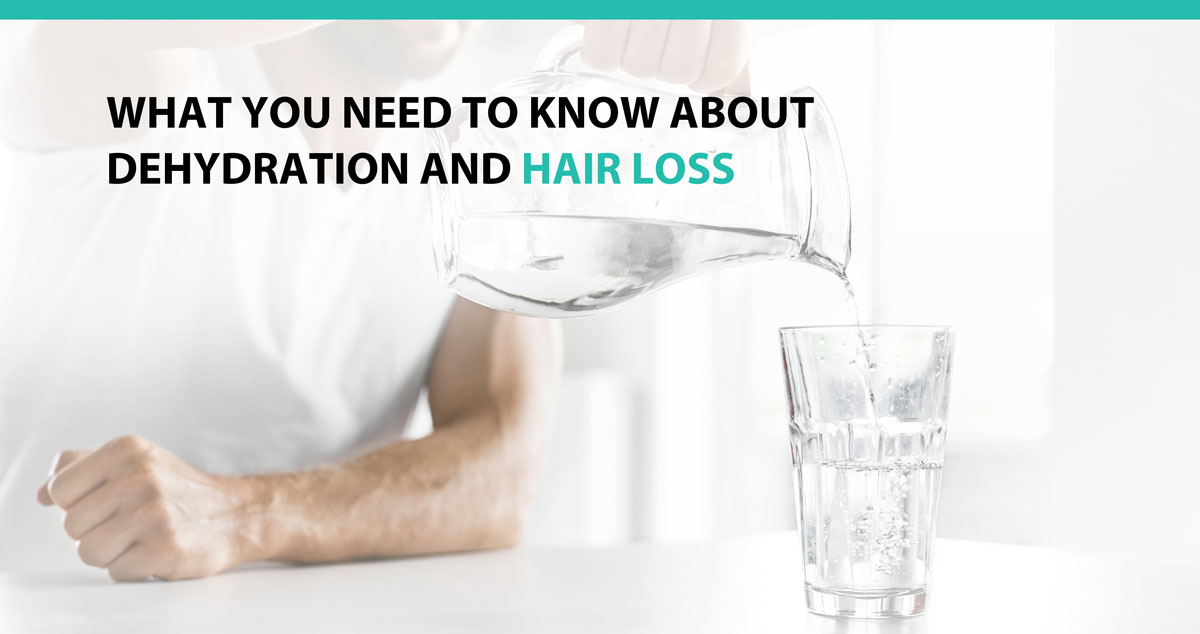
Common causes of male pattern baldness include hormonal changes, hereditary, and medical conditions. However, there are unknown triggers, such as dehydration. At the Advanced Medical Hair Institute, we perform various tests to determine the exact cause. Other than a blood test, they include a pull test, scalp biopsy, and light microscopy. Dr. Williams also asks questions about your hair care routine and diet, including your water intake.
How Does Dehydration Cause Hair Loss?
Water makes up around 25% of the hair shaft, making it just as essential to hair health as proper nutrition. Long-term dehydration causes your body to prioritize how it will use the little water it receives. It reroutes this valuable nutrient from your skin, nails, and hair, then commits it to more vital body organs.
As your integumentary system goes without adequate water, your follicles struggle to produce new hair. Ultimately, you’ll shed more hair than your body can replace, which causes thinning or baldness. It’s advisable to drink at least 3 liters daily to boost hair growth and your overall health. Other than providing nourishment, water supports vitamins, which also contribute to healthy hair.
Signs of Dehydration
Early dehydration symptoms include a dry mouth, dark-colored urine, headaches, dizziness, muscle weakness, and fatigue. You may also experience extreme thirst and go for long periods without urinating. You’ll develop dry skin and other health concerns as the condition develops.
Brittle hair is one of the most apparent signs of dehydration. It results in accelerated shedding and breakage because your hair strands are thinner and not as healthy. Since it sheds from the roots and breaks at any point, your hair will have uneven length and thickness.
How to Stay Hydrated
Some people think drinking more than three liters of water daily is hard. It’s possible if you follow these tips:
- Keep water close
You’re more likely to drink water if you have it at hand. Make a habit of carrying a liter bottle to work or in your bag when running personal errands. You’ll hit your target if you sip small amounts at regular intervals throughout the day.
- Try flavored options
There are healthy flavored alternatives if you find it hard to drink liters of “tasteless” water. They include adding sliced fruits, vegetables, and veggies such as lemons, cucumbers, and strawberries. If you must buy flavored options, avoid artificial sweeteners. It’s also advisable to minimize or eliminate sugar-rich beverages such as soda, energy drinks, and lemonade.
- Use an app
There are countless fitness and health apps for both iOS and Android devices. They include hydration apps such as Hydro Coach, WaterMinder, Aqualert, My Water, and Drink Water Reminder. They help you set daily goals, create custom healthy drinks, and sync with other wellness apps such as Google Fit.
- Adopt a healthy diet
Alcohol, some sodas, and other drinks can increase dehydration. Drink lots of water to counter the loss and incorporate water-rich foods into your diet. They include watermelon, strawberries, tomatoes, plain yogurt, cabbage, peaches, oranges, cauliflower, cucumber, skim milk, grapefruit, cantaloupe, lettuce, Zucchini, and celery. Broths and soups also promote weight loss due to their low calories while increasing your water content.
- Mark your bottle
You can place marks on your water bottle to help you hit your hydration goals. Most fitness bottles are premarked to show you how many ounces and liters you consume every few hours.
Dr. William Is the Solution to Your Hair Issues
At the Advanced Medical Hair Institute, we take an all-round approach to solving hair problems. Other than state-of-the-art hair restoration procedures such as FUT and FUE, Dr. Williams also champions preventive measures. With unmatched skills and several years of experience in the industry, he’ll restore your hair to its most natural look. Please make an appointment today for a precise diagnosis and practical treatment plan.










